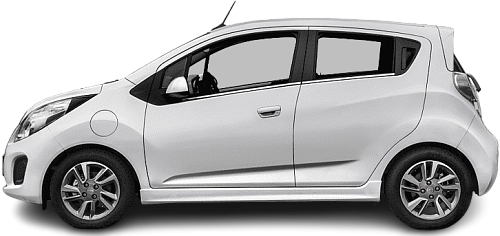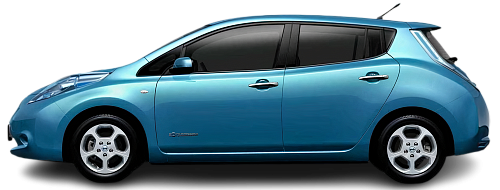USA EV Comparison: Chevrolet Spark EV 21 kWh vs Nissan Leaf 30 kWh
Struggling to Decide? Let AI Help!
Your AI Summary Is Ready!
General Info
Since both vehicles have been discontinued, they are now only available on the used car market. You can get the Chevrolet Spark EV 21 kWh (2013-2014) for as low as $4499, while the Nissan Leaf 30 kWh (2015-2018) begins at $3500.
The two vehicles share the same body style: Hatchback.
| Property | Chevrolet Spark EV 21 kWh | Nissan Leaf 30 kWh |
|---|---|---|
| Years of Production | 2013-2014 | 2015-2018 |
| Current Status | Discontinued | Discontinued |
| Country of Manufacture | South Korea | Japan, UK, USA |
| Body Style | Hatchback | Hatchback |
| Market Availability | USA | EU, USA |
| Price USA (Used) | $4499 | $3500 |
| GCC Score | 4.1 | 4.3 |
Range and Efficiency
While the Nissan Leaf 30 kWh (2015-2018) offers a longer real-world range and a bigger battery, it is less energy-efficient than the Chevrolet Spark EV 21 kWh (2013-2014).
| Property | Chevrolet Spark EV 21 kWh | Nissan Leaf 30 kWh |
|---|---|---|
| Range (EPA) | 82 mi | 107 mi |
| Range (GCC) | 78 mi | 109 mi |
| Battery Capacity (Nominal) | 21.4 kWh | 30 kWh |
| Battery Capacity (Usable) | 20 kWh | 28 kWh |
| Efficiency per 100 mi | 25.6 kWh/100 mi | 25.7 kWh/100 mi |
| Efficiency per kWh | 3.9 mi/kWh | 3.89 mi/kWh |
| Range and Efficiency Score | 5.1 | 5.3 |
Charging
Both vehicles utilize a standard 400-volt architecture.
Both vehicles support DC fast charging with a maximum power of 50 kW.
Both vehicles are equipped with the same on-board charger, supporting a maximum AC charging power of 3.3 kW.
| Property | Chevrolet Spark EV 21 kWh | Nissan Leaf 30 kWh |
|---|---|---|
| Max Charging Power (AC) | 3.3 kW | 3.3 kW |
| Max Charging Power (DC) | 50 kW | 50 kW |
| Architecture | 400 V | 400 V |
| Charge Port | CCS Type 1 | CHAdeMO |
| Charging Score | 2.6 | 2.7 |
Performance
Both vehicles are front-wheel drive.
The Chevrolet Spark EV 21 kWh (2013-2014) boasts greater motor power and accelerates faster from 0 to 60 mph.
| Property | Chevrolet Spark EV 21 kWh | Nissan Leaf 30 kWh |
|---|---|---|
| Drive Type | FWD | FWD |
| Motor Type | PMSM | PMSM |
| Motor Power (kW) | 105 kW | 80 kW |
| Motor Power (hp) | 140 hp | 107 hp |
| Motor Torque | 400 lb-ft | 187 lb-ft |
| 0-60 mph | 7.5 s | 10.4 s |
| Top Speed | 90 mph | 90 mph |
| Performance Score | 3.5 | 2.2 |
Dimensions
The Nissan Leaf 30 kWh (2015-2018) is longer and wider, but the Chevrolet Spark EV 21 kWh (2013-2014) is taller.
The Nissan Leaf 30 kWh (2015-2018) boasts a more extended wheelbase.
| Property | Chevrolet Spark EV 21 kWh | Nissan Leaf 30 kWh |
|---|---|---|
| Length | 146.5 in | 175 in |
| Width (with Mirrors) | - Width (with Mirrors) | 77.4 in |
| Width (w/o Mirrors) | 64 in | 69.7 in |
| Height | 62.6 in | 61 in |
| Wheelbase | 93.5 in | 106.3 in |
Cargo and Towing
The Nissan Leaf 30 kWh (2015-2018) provides more cargo capacity, featuring both a larger trunk and more space with the rear seats folded.
Neither car is equipped with a frunk (front trunk).
Neither vehicle is officially rated for towing in the US.
| Property | Chevrolet Spark EV 21 kWh | Nissan Leaf 30 kWh |
|---|---|---|
| Number of Seats | 4 | 5 |
| Curb Weight | 2989 lb | 3390 lb |
| Cargo Volume (Trunk) | 9.6 ft3 | 13.1 ft3 |
| Cargo Volume (Max) | 23.4 ft3 | 25.4 ft3 |
| Cargo Volume (Frunk) | - Cargo Volume (Frunk) | - Cargo Volume (Frunk) |
| Towing Capacity | - Towing Capacity | - Towing Capacity |
| Cargo and Towing Score | 4.2 | 4.6 |




